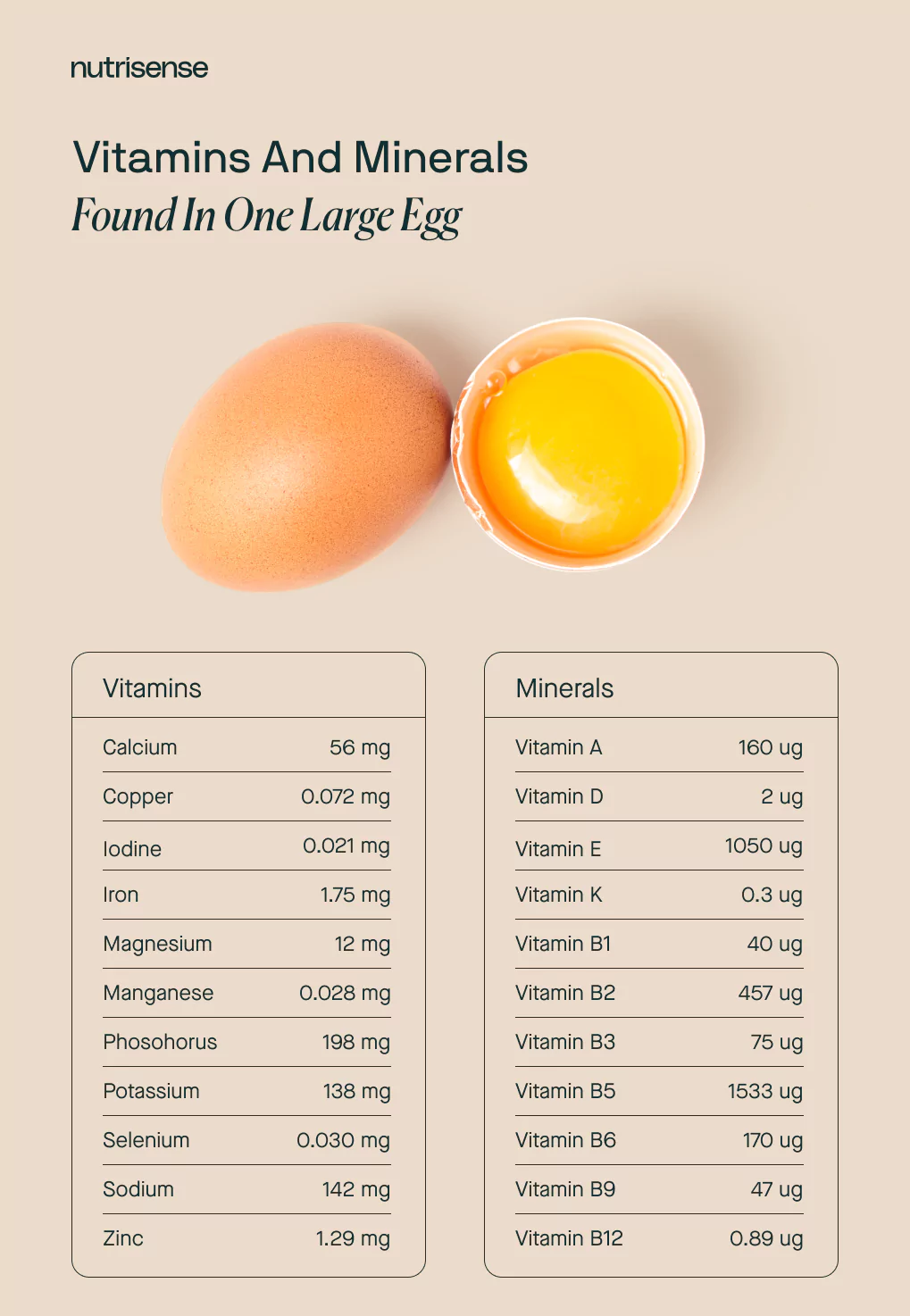
Nutritional Profile: What’s in One Large Egg?
A single large egg (~50 grams, boiled) contains approximately:
-
Calories: ~72–78 kcal
-
Protein: ~6 grams — high‑quality “complete” protein, meaning it has all nine essential amino acids
-
Fat: ~5 grams, including both saturated and unsaturated fats
-
Cholesterol: ~186 mg (mainly in the yolk)
-
Vitamins & Minerals: Eggs are rich in vitamin A, B vitamins (B2/riboflavin, B5, B12), vitamin D, vitamin E, folate, phosphorus, selenium, etc.
-
Antioxidants & Other Nutrients: Lutein, zeaxanthin (good for eyes), choline (important for brain and liver), and trace minerals.
What Happens to Your Body When You Eat One Egg Daily
Here are the key changes and improvements you may experience over time:
-
Improved Muscle Repair & Growth
Protein in eggs is of high bioavailability — your body can use it well to build and repair tissues, including muscle. If you’re active, one egg per day helps meet daily protein needs. -
Enhanced Brain Function
Eggs are one of the best sources of choline, an essential nutrient for neurotransmitter production, memory, mood regulation, and overall brain health. Daily intake supports cognitive function. -
Better Eye Health
Lutein and zeaxanthin are antioxidants found in egg yolks that accumulate in the retina, reducing risk of age‑related macular degeneration and cataracts. One egg daily contributes to protecting your vision. -
Support for Bone Health
Eggs provide vitamin D (though not huge amounts), which helps your body absorb calcium and maintain strong bones. Also phosphorus and other minerals in eggs contribute to bone strength. -
Healthy Skin, Hair, & Nails
Protein, vitamins A and B, choline, and trace minerals in eggs help maintain healthy skin and hair. Biotin (vitamin B7) though present in small amounts, also contributes. -
Heart Health & Cholesterol Balance
-
For most healthy people, regular consumption of one egg per day does not increase risk of heart disease. Some studies have found even reduced risk of stroke and cardiovascular mortality for people who eat eggs daily compared to those who eat none.
-
Eggs increase HDL (the “good” cholesterol) in many people, which helps protect against heart disease. The impact on LDL (“bad” cholesterol) tends to be small in healthy individuals and depends more on the rest of the diet (especially saturated fats).
-
-
Greater Satiety & Possible Weight Management
Because of their protein content and healthy fats, eggs can help you feel full longer, reduce unnecessary snacking, and regulate appetite — which may help with weight loss or maintenance.
Qualities of Eggs That Make Them Unique
Here are what make eggs especially good:
-
Complete Protein Source: All essential amino acids. Great for vegetarians (non‑vegans) or anyone needing high‑quality protein.
-
Dense in Micronutrients: Many vitamins and minerals, some rare ones like choline.
-
Versatility: Boiled, poached, scrambled, baked — eggs adapt to many cooking styles.
-
Affordability & Accessibility: Compared to many other sources of high‑quality protein, eggs are relatively cheap and easy to obtain.
-
Low in Carbohydrates: Suitable for low‑carb diets.

Possible Risks & Precautions
Even though one egg a day is good for most, there are some caveats:
-
High Cholesterol Content: If your diet already includes a lot of dietary cholesterol or saturated fat, adding egg yolks might raise LDL cholesterol in some “hyper‑responders.”
-
Underlying Health Conditions: If you have diabetes, familial hypercholesterolemia, or cardiovascular disease, you should consult your doctor — some studies show elevated risk in these populations with high egg intake. How Eggs Are Prepared Matters: Fried in a lot of butter or served with processed meats (e.g. bacon) can negate many of the health benefits. Prefer boiling, poaching, or baking.
-
Balance with Other Foods: Eating one egg daily isn't a license to ignore fruits, vegetables, whole grains, fiber. Nutrition is holistic.
Expert Guidelines & Research Findings
Here are what experts / recent studies say:
-
The Mayo Clinic: Most healthy people can eat up to 7 eggs per week without increasing risk of heart disease. One egg per day is generally safe for healthy individuals.
-
Large cohort studies (in China, etc.) suggest daily egg consumption correlates with lower risk of certain types of stroke and lower cardiovascular mortality.
-
Systematic reviews suggest eating eggs in moderation (one egg per day) is not associated with higher cardiovascular disease risk in general populations. However, eating many eggs or having high dietary cholesterol consistently may have some increased risk depending on your overall diet.
SEO Keywords & Tags
To make this article Google‑indexable and help it rank well, include the following:
Keywords:
-
benefits of eating one egg a day
-
what happens if you eat an egg daily
-
egg nutrition facts
-
one egg a day health effects
-
eggs and cholesterol
-
egg protein benefits
-
egg vitamins
-
can eggs improve brain health
-
Choose quality eggs: Pastured, omega‑3 enriched, or free‑range if possible—they often have better nutrient profiles (more vitamin A, E, omega‑3s).
-
Use healthy cooking methods: Boiled, poached, or lightly cooked rather than heavy frying.
-
Watch what you pair eggs with: Vegetables, whole grains, lean proteins — not processed meats or heavy saturated fats.
-
Yolk vs white: If you have concerns about cholesterol or heart health conditions, using more egg whites and fewer yolks can reduce cholesterol intake while still preserving protein.
-
Include variety: While eggs are great, pair with fruits, vegetables, legumes to get fiber, antioxidants, other nutrients eggs don’t provide in high amounts.
Conclusion
Eating one egg a day can offer many positive effects: improved muscle health, brain and eye benefits, better bone strength, high‑quality protein, and even support for cardiovascular health for many people. The cholesterol in eggs, once feared, seems to have much less negative effect than previously thought—particularly when your overall diet is healthy and balanced.
However, if you have specific health issues (like diabetes or high cholesterol), it’s wise to monitor egg intake and discuss with a healthcare provider. Overall, for most people, this simple, nutritious food can be a beneficial part of daily eating.

You must be logged in to post a comment.